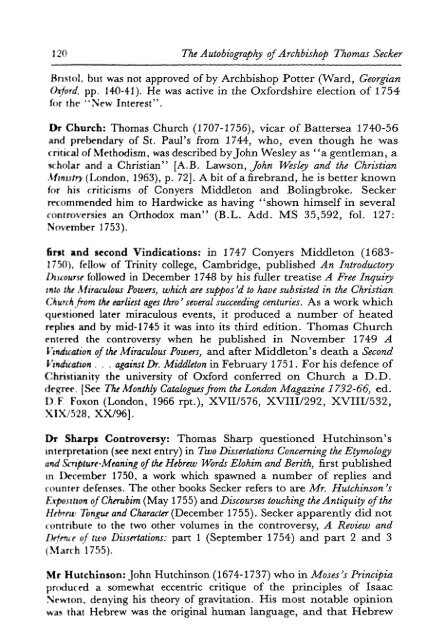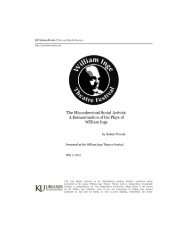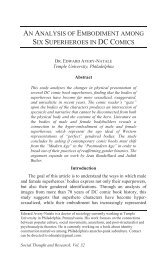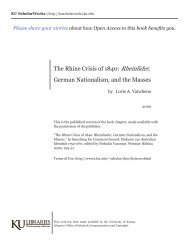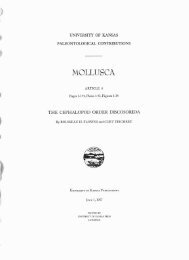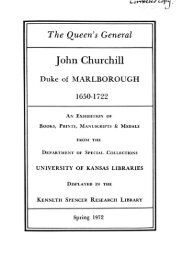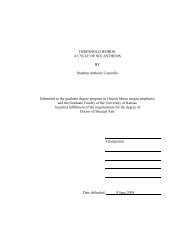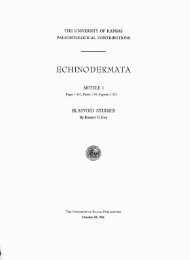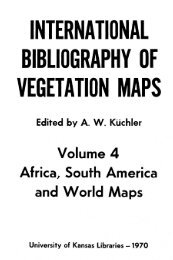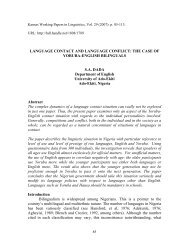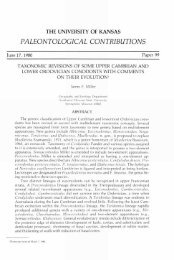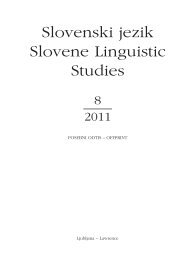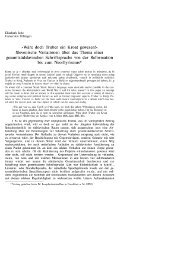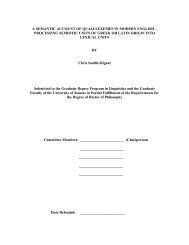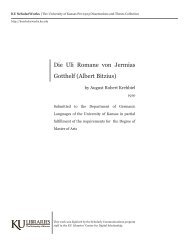Archbishop of Canterbury - KU ScholarWorks - The University of ...
Archbishop of Canterbury - KU ScholarWorks - The University of ...
Archbishop of Canterbury - KU ScholarWorks - The University of ...
You also want an ePaper? Increase the reach of your titles
YUMPU automatically turns print PDFs into web optimized ePapers that Google loves.
120 <strong>The</strong> Autobiography <strong>of</strong> <strong>Archbishop</strong> Thomas Seeker<br />
BnMol, but was not approved <strong>of</strong> by <strong>Archbishop</strong> Potter (Ward, Georgian<br />
Oxford, pp, 140-41). He was active in the Oxfordshire election <strong>of</strong> 1754<br />
for the 44 New Interest".<br />
Dr Church: Thomas Church (1707-1756), vicar <strong>of</strong> Battersea 1740-56<br />
and prebendary <strong>of</strong> St. Paul's from 1744, who, even though he was<br />
critical <strong>of</strong> Methodism, was described by John Wesley as "a gentleman, a<br />
scholar and a Christian" [A.B. Lawson, John Wesley and the Christian<br />
Ministry (London, 1963), p. 72]. A bit <strong>of</strong> a firebrand, he is better known<br />
for his criticisms <strong>of</strong> Conyers Middleton and Bolingbroke. Seeker<br />
recommended him to Hardwicke as having "shown himself in several<br />
controversies an Orthodox man" (B.L. Add. MS 35,592, fol. 127:<br />
November 1753).<br />
firtt and second Vindications: in 1747 Conyers Middleton (1683-<br />
1750), fellow <strong>of</strong> Trinity college, Cambridge, published An Introductory<br />
Diu our it followed in December 1748 by his fuller treatise A Free Inquiry<br />
into ike Miraculous Powers, which are supposed to have subsisted in the Christian<br />
Church from the earliest ages thro 7 several succeeding centuries. As a work whic<br />
questioned later miraculous events, it produced a number <strong>of</strong> heated<br />
replies and by mid-1745 it was into its third edition. Thomas Church<br />
entered the controversy when he published in November 1749 A<br />
Vindication <strong>of</strong> the Miraculous Powers, and after Middleton's death a Second<br />
Vindication . . . against Dr. Middleton in February 1751. For his defence <strong>of</strong><br />
Christianity the university <strong>of</strong> Oxford conferred on Church a D.D.<br />
decree, [See <strong>The</strong> Monthly Catalogues from the London Magazine 1732-66, ed.<br />
D F Foxon (London, 1966 rpt.), XVII/576, XVIII/292, XVIII/532,<br />
XiX/528, XX/96].<br />
Dr Sharps Controversy: Thomas Sharp questioned Hutchinson's<br />
interpretation (see next entry) in Two Dissertations Concerning the Etymology<br />
and Scripture-Meaning <strong>of</strong> the Hebrew Words Elohim and Berith, first published<br />
in December 1750, a work which spawned a number <strong>of</strong> replies and<br />
counter defenses. <strong>The</strong> other books Seeker refers to are Mr. Hutchinson's<br />
Exposition <strong>of</strong> Cherubim (May 1755) and Discourses touching the Antiquity <strong>of</strong> the<br />
Hebrew Tongue and Character (December 1755). Seeker apparently did not<br />
contribute to the two other volumes in the controversy, A Review and<br />
Defentt <strong>of</strong> two Dissertations: part 1 (September 1754) and part 2 and 3<br />
(Man hi 755).<br />
Mr Hutchinson: John Hutchinson (1674-1737) who in Moses's Principia<br />
produced a somewhat eccentric critique <strong>of</strong> the principles <strong>of</strong> Isaac<br />
Newton, denying his theory <strong>of</strong> gravitation. His most notable opinion<br />
vids that Hebrew was the original human language, and that Hebrew


